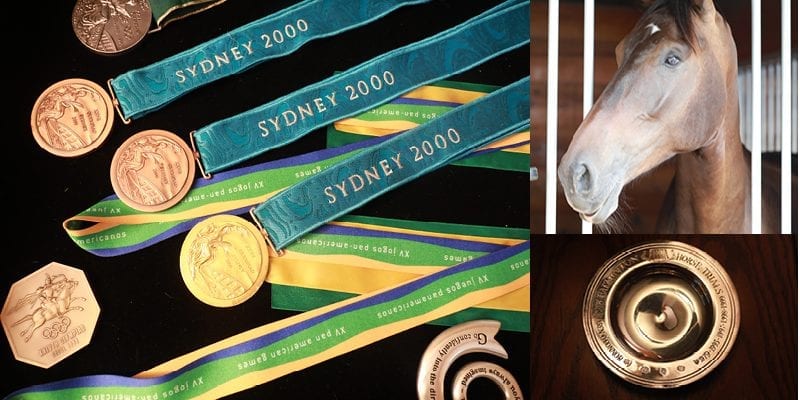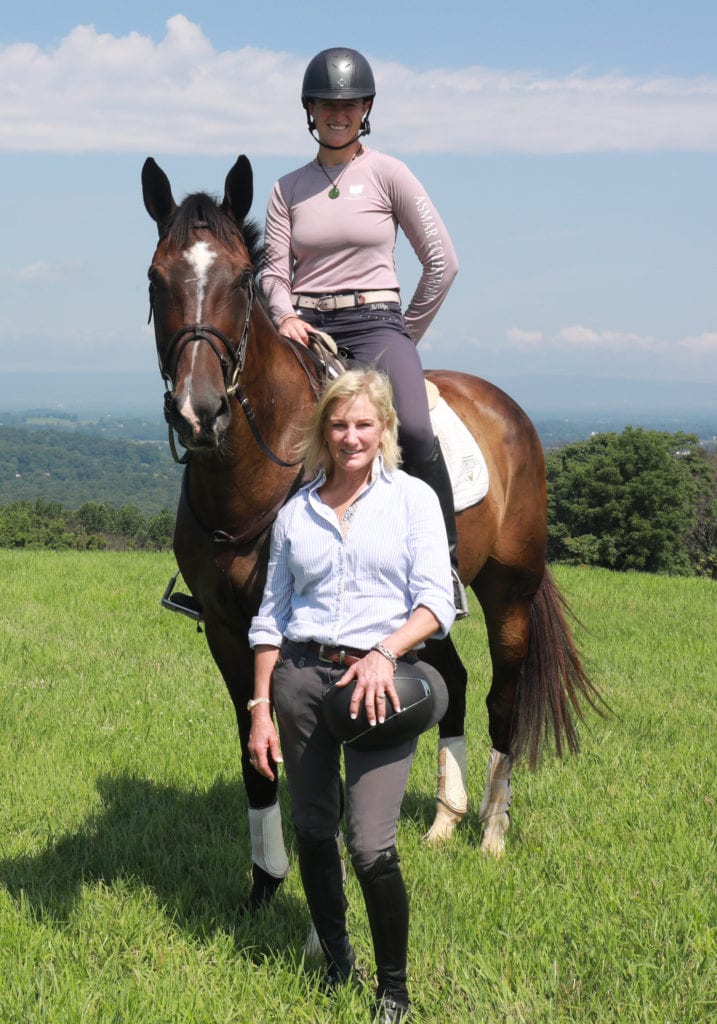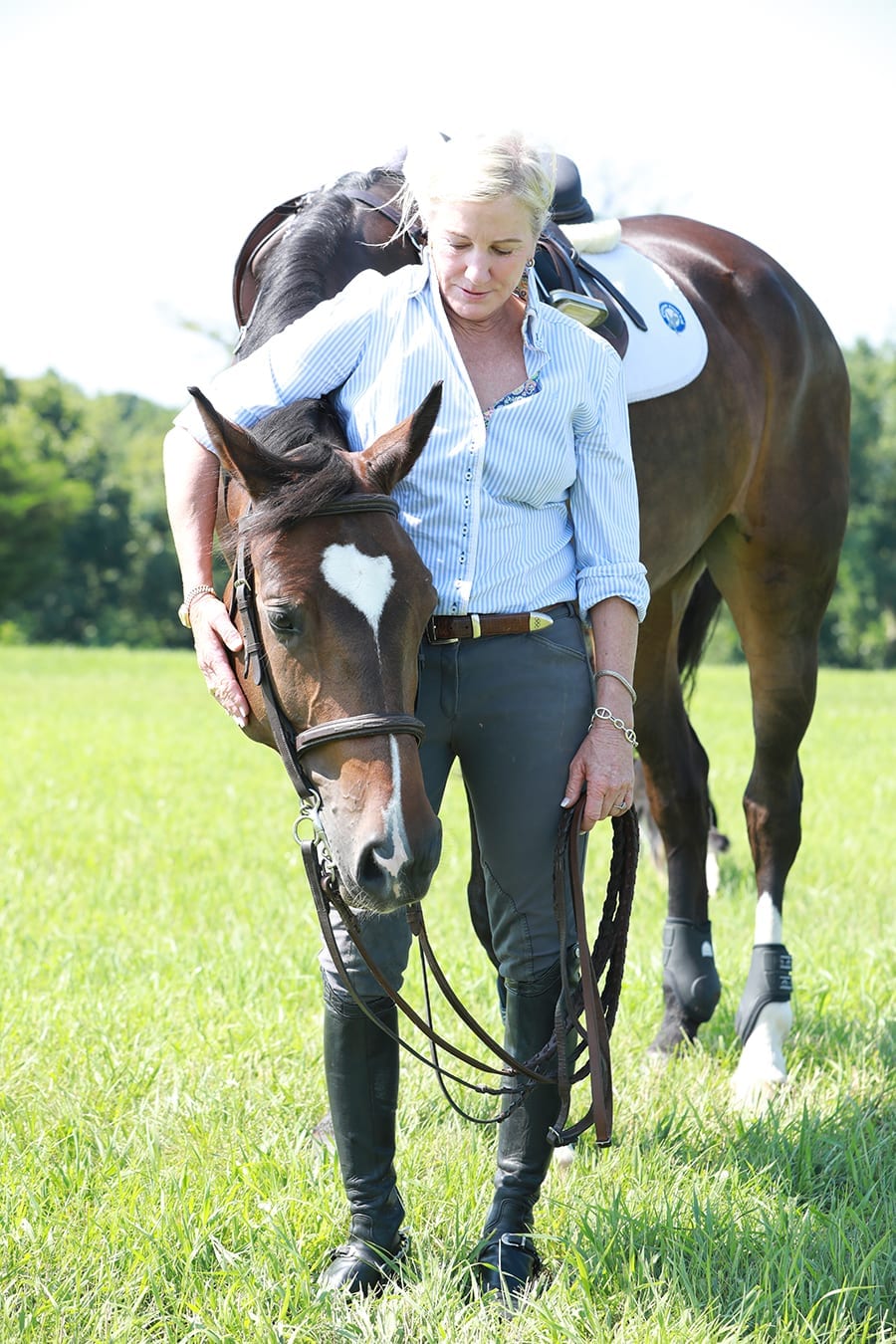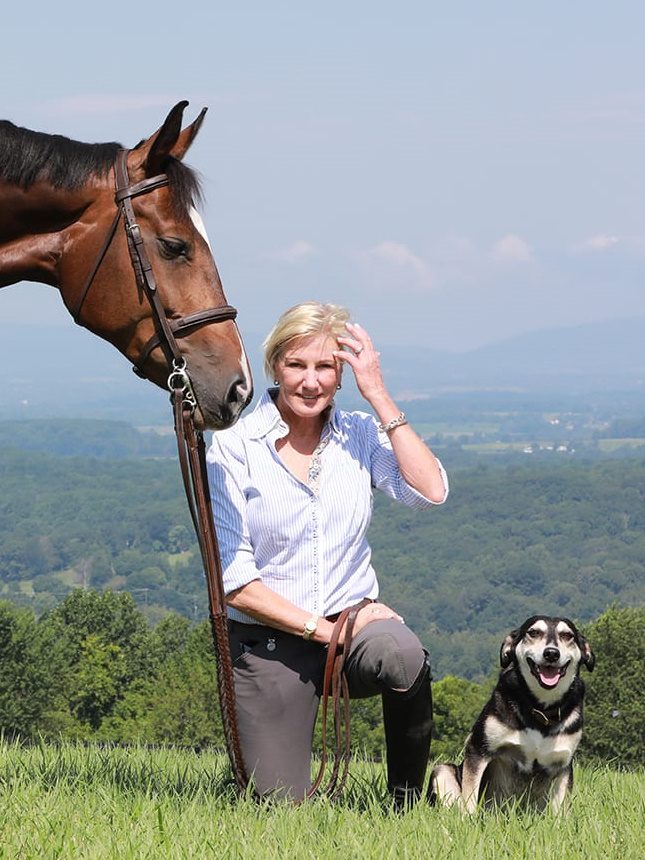Three-Day Eventer & Olympian
Three-day eventer Karen O’Connor has been fascinated with animals, horses especially since she was a little girl. Named U.S. Female Equestrian Athlete of the Year 10 times, Karen has competed in five Olympic Games, winning a silver in 1996 and a bronze in 2000 — an honor she shares with fellow equestrians and husband David, the only husband-and-wife team to achieve such a feat. After a career-ending injury removed her from the ring for several years, O’Connor has defied the odds and is back in the saddle with unmatched determination.
At age 11, your parents gave you Erin’s Shamrock, your first horse. Was that the beginning of your love of animals?
I always had a huge, huge love for animals. Any animal. Anything with fur. The first animal I fell in love with was a cow. I was mesmerized by the dairy cows and beef cows I saw on the drive from Massachusetts to New Hampshire when we visited my cousins. My dad would stop, so I could go out into the pastures with the cows. They would lick my hand and just make me giggle. The top of their tongue is like Velcro, and I thought that was cool. I let them lick my face. My brothers thought I was crazy; they just sat in the back seat. I found animals were so much cooler than people, at that age. We always had dogs, a Newfoundland when we were kids. Then, I had a great Siamese cat that was super smart. I taught him tricks. My relationships, early on, were all with animals.
Who was the person that most influenced you as a young woman?
When I came to Virginia for the first time, I had some very strict school masters that molded me. I excelled very fast as a young athlete — very fast. By the time I graduated from high school, I was a national champion and competing at two levels higher than most people my age. My mother was the biggest influence in my life. She said a lot of things that were very short, but they were to the point.
Like?
Like, “Go through life looking like an exclamation point, never a
question mark.”
How competitive are you?
A lot of people say I am very competitive. I could make a competition out of saying good morning. I think about everything in a competitive way. It is that competitive spirit — with somebody else sometimes — but mostly it’s against the task at hand.
What differentiates you from other riders?
I think in rhythm. Everything I do is always in a rhythm. I can tell you how many steps there are in the staircase here. I can tell you how many steps there are in the staircase in Florida. It’s always numbers. So, mathematics and rhythm. David says my natural ability is balance. As a kid, I had crazy, natural balance, so I was great on the trampoline. I was great at diving and flips and spins. I guess I would say a handful of things have worked together for me; rhythm, technical merit, the will to win, balance, and also the strength of character to never give up.
Perseverance. You just never quit?
No. Never. Never.
Is your husband like that?
David has extraordinary hand-eye coordination. He excels at things like golf and tennis and any sport that has hand-eye coordination. He is a scratch golfer. He really has a natural ability for being able to use his body because he is hyper-mobile in all his joints. I imagine, when he’s on a horse, there is an absorption of impact.

The Armada Cup (pictured bottom right), given to a rider that has completed five Badminton Horse Trails, a competition in England, is one of O’Connor’s proudest achievements; O’Connor has competed in five Olympic games, winning a team silver in 1996 and team bronze in 2000 alongside her husband, David.
What does success look like to you?
That you complete a task to the best of your ability on that day given the variables of the situation. A competitive success means you have given a hundred percent towards the effort; it can be something minute or something very broad. It can be detailed. For instance, when I was at Sydney, and I was the last rider to go, our coach, Mark Phillips, sat me down and said, “Here’s the deal. We need you to go clear and go inside the time. If that doesn’t happen, then we’re out of the team medals.” It can be as difficult a task as that. You know your sport. You know yourself. You know your horse on that day. You know the course because you’ve walked it six times. You know how other people have handled it. And you have trained your whole life for what we call “Saturday Night Lights,” where you are the quarterback, and you have to throw that ball 50 yards in the end zone, and the guy has to pick it off.
And you cannot buckle under the pressure?
Not even a little bit, the antithesis. Before you get on, you drain your body completely of any negative energy.
How do you do that?
I think you learn it.
You competed in five Olympics. You and your husband received medals in two Olympics, which is historic and never done before or since. How did competing at such mercuric levels impact the inner dynamics of a marriage?
We did detailed research to find the commonalities so that we could succeed individually, but also together. We prepare very differently, mentally. I like a lot of people around me. I like my circle of trusted teachers, family, and friends. David retreats, and he wants to be very alone. We had to prepare ourselves for international competition in our own way and respect each other for that. There was absolutely a conscious decision on how we would address certain things. But, when we got in the starting blocks, and we were going down the center line, that was totally different. All bets were off. May the best man win.
How does that work in a relationship?
Well, I think we had to craft it. We were together for seven years, with very strong personalities, before we got married. We had to find the commonality, find the strengths, and the forgiveness of different aspects of our personality. We said, “We only want to do this one time.” That is a very hard thing to do; to have a relationship for the rest of your life, which we both 100% believe in. We took our time. We both were successful when we started dating. I had my group of owners, horses, family, and friends, and David had the same. At the beginning, it was very hard. Whether they were David’s or my owners, their goal was to beat other horses. For our respective owners to come together, and share. It took time; the relationships had to mature slowly.
Was there an owner that you were so close with that stood out from the rest?
There were two owners. The first one is Jacqueline Mars. The second ones were Dick and Vita Thompson from Malden, Pennsylvania, who have since passed away.
What do owners ultimately want?
You have to try to understand why someone would want to own a horse that they aren’t competing themselves. Do they want to win? Maybe. Do they just want me to become the rider of their horse that is top-of-the-sport? Do they want to have a young horse that they want to watch brought along? Do they want to have access to you? Do they want to call you on Christmas morning? Do they want you at a cocktail party, to use your name? What exactly do they want? My fascination was with why would they want to have a rider. And whatever it was they wanted, I would then try to fulfill that. In the final analysis, I think they almost all do it because they missed their chance to compete.
Can you tell me about your students?
This summer, we have five, a good number for right now because of my traveling, teaching, and coaching. David, too. When we were at full capacity, we managed a hundred horses, and we had half of those here on the property. Mom and Dad had a home here on the property, and they ran the bed and breakfast. It was a great way for kids to learn how to conduct themselves. They came as teenagers 17, 18, 19 years old, some from wealthy families, but not all. They all share a passion for horses. Every one of them had gone through a bit of bullying along the way. Boys get terribly bullied to be in the horse sports. I think girls get a little bit bullied later in life in the horse sports. Horses were a way to escape, but they all had some issues as kids. All of them. You know, issues on how talk to people, how to handle your anger, how to concentrate on things, how to have a work ethic. We believe very strongly that you conduct yourself in the same way both on and off the field of play. When you are sitting in a restaurant, there’s a protocol and an etiquette to the way you talk, the way you eat, the way you wait for your turn to speak again. Mom had a great way of helping to mold them. These kids worked really hard, and some of them became Olympians. They would come in, and there would be six or eight kids at any one time. Over dinner with Mom and Dad, it was important for each one of them to discuss their day with the group. They talked about what upset them. Maybe they were mad at David or me, but they had a way to discuss it with adults. Then, when dinner was finished, those kids would get up and clear the table. No one stacked any dishes at the table. No. In my Mother’s generation, you never did that. You took your plate away just like at a fine restaurant. They learned how to do all that — how to set the table as well. The kids washed the dishes while Mom and Dad had their private time.

O’Connor has mentored and trained hundreds of students, who, like Lauren Kieffer (pictured above) have gone on to become Olympians in their own right.
If you had to select either will to win or natural skill with your students, which is more important to succeed in this sport?
A will to win. Will to win is number one for me, for sure. Ben (my student) has the will to win. He spends his time learning how to win. Horses, his passion, are the vehicle for a highly competitive temperament.
Do you have fear?
I had a huge fear of failure. I was never afraid to fall down or hurt myself, but I had a big fear of failure. I didn’t do my first Olympics until I was 30 because of an inconsistency in my own temperament, my own mental preparation.
What is your most coveted trophy and why?
In our sport, you go up the levels, but it is difficult to stay there. There is a competition in England called Badminton. The best accomplishment I felt I ever had was when I received the Armada Cup which is given to a rider that has completed five Badmintons. When you don’t live in England, you don’t get the opportunity to compete there as much. Only two Americans have ever received it. One was Bruce Davidson, who is 15 years older than me. I’m the only other American to have ever won that distinction. That would be my most coveted trophy, even though the hallway is full of trophies. This trophy is in the shadow box next to the medals. It’s just a tiny, little silver bowl, but it has the years that you completed it and the horse’s names, and it’s a beautiful piece of silver.
What do you want to be remembered for?
I want to be remembered as somebody that could talk to the animals and accomplish something that looks extraordinarily difficult, while making it look easy from the outside. We compete, and it’s a high-risk sport. I want to be remembered as the person that could take any kind of horse around a difficult course and have enough communication with them so that when they were presented to a jump or a task, they understood it completely, and it became stupidly simple for them.
You were in a terrible riding accident which effectively ended your competitive career, and yet, you continue to ride?
After the accident, it took three or four years for my body to get sorted out. I am physically in a very stable place where I can be more athletic. I have a Pilates instructor in Florida who is totally committed, so every morning, I am there at 6:30. She has helped to get me strong and fit. After the accident, my body was rejecting a lot of things. Today, I can ride however often I want to. I’m jumping. I can go cross-country. I do everything. Once you’ve had a catastrophic accident, you have to give your body a chance to recover, to heal. Once it’s finished receiving and accepting whatever changes are needed to live, that’s when you can sort of say, “Well, okay. I want to do this.” Your body or your brain says, “Well, then go do it.” Your body will actually talk to you and say, “Then come on. Let’s go do it. I want to do it, too.”
Your doctor said you can ride, but if something happens, he could not fix it.
“After the accident, my body was rejecting a lot of things. Today, I can ride however often I want to. I’m jumping. I can go cross-country. I do everything. ”
He said, “Well, make sure you fall good because you don’t want what’s left of your back, left over.” But, you see, my most comfortable place on the planet is sitting on a horse. I have a great friend, Marilyn Little. When I came back down to Florida, (after throwing out my meds and taking off my protective brace), I said, “I’m good. The doctor says I can start riding if I want to.” Marilyn got a horse and said, “Get on.” I said, “Right now?” “Yep, get on.” So, I got on the horse. I always have paddock boots on. I was sort of halfway dressed, and she says, “Okay, come on, let’s go, walk, trot, canter.” She’s younger than me. She’s 15 years younger, and she said, “Come on, let’s do it, go on.” And I felt as happy as I’d been since I was injured because I was on something that was so comfortable. And then she said, “Okay, come on, canter over this jump.” First day! “Canter over the jump.” And I went, “Really, you think I should?” She goes, “Come on! You’ve jumped a million jumps. Jump this jump.” And I did that. And I jumped several more. And she said, “Good. Welcome back.”
Isn’t that a life lesson, when you’re thrown, get back on the horse?
They don’t let you do that in competition anymore. If you fall off, you’re done for the day. I suppose they figure you’re out of the competition. Live to fight another day. I don’t know if that’s good. I had a big conversation recently with my family about trampolines. When we were young, we had a trampoline, but it had no net. Now, all the trampolines have this huge net. If you put that into a life lesson, what’s the lesson? When I was a kid on a trampoline with no net, if I took the risk, it was a calculated risk. There was always a consequence. With the huge net, you do not know about consequence. Not that we all have to be risk takers, but you have to be very aware of what you’re capable of doing and only take the calculated risk if you are willing to face the consequences.
You really are a success story, Karen. Share with our readers a simple life lesson.
I would say be nice to people on your way up because you will see them on the way down. And be nice to everybody. Ellen DeGeneres, at the end of each show, says be nice to people. You could have a huge competitive spirit, but you must do it with dignity and honor. Be nice.


